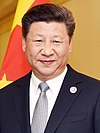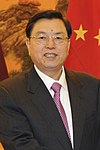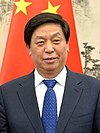2018 National People's Congress
| |||||||||||||
|---|---|---|---|---|---|---|---|---|---|---|---|---|---|
| |||||||||||||
| |||||||||||||
| Website | |||||||||||||
| 2018 NPC official website | |||||||||||||

The 2018 National People's Congress, or the First Session of the 13th National People's Congress, was held in March 2018 at the Great Hall of the People in Beijing, China. The session opened on 5 March[1] and concluded on 20 March.[2] Major state positions were elected in this session.
The Chinese Communist Party proposed amending the Constitution, for the first time after 2004,[3] including writing Scientific Outlook on Development and Xi Jinping Thought into the Preamble,[4] and removing the provision that the President and Vice President "shall serve no more than two consecutive terms" from the Constitution.[5] Amending the Constitution of China requires a majority vote of two-thirds of all the deputies to the Congress.[6] On 11 March 2018, the Congress passed the amendment in the third plenary meeting of this session,[7] attended by 2,964 out of 2,980 deputies, with 2,958 votes for, two against, three abstaining, and one void.[8][9]
On 17 March 2018, Xi Jinping, General Secretary of the Chinese Communist Party, was unanimously re-elected as the President of the People's Republic of China and the Chairman of the Central Military Commission,[10] and Li Zhanshu was elected as the Chairman of the Standing Committee of the National People's Congress.[11]
Li Keqiang was nominated as the Premier by President Xi Jinping and approved by the Congress on 18 March 2018.[12] Han Zheng, Sun Chunlan, Hu Chunhua and Liu He are nominated as the Vice Premiers by Premier Li Keqiang and approved by the Congress on 19 March 2018.[13]
Voting results
[edit]State positions
[edit]| NPCSC Chairman Election | NPCSC Secretary-general Election | ||||||
|---|---|---|---|---|---|---|---|
| Candidates | For | Against | Abstain | Candidates | For | Against | Abstain |
| Li Zhanshu | 2980 | 0 | 0 | Yang Zhenwu | 2980 | 0 | 0 |
| Presidential Election | Vice-Presidential Election | ||||||
| Candidates | For | Against | Abstain | Candidates | For | Against | Abstain |
| Xi Jinping | 2980 | 0 | 0 | Wang Qishan | 2969 | 1 | 0 |
| NPCSC Vice-Chairmen Election | NSC Director Election | ||||||
| Candidates | For | Against | Abstain | Candidates | For | Against | Abstain |
| Wang Chen | 2980 | 0 | 0 | Yang Xiaodu | 2969 | 1 | 0 |
| Cao Jianming | 2980 | 0 | 0 | ||||
| Zhang Chunxian | 2979 | 1 | 0 | ||||
| Shen Yueyue | 2979 | 1 | 0 | ||||
| Ji Bingxuan | 2980 | 0 | 0 | ||||
| Arken Imirbaki | 2980 | 0 | 0 | ||||
| Wan Exiang | 2980 | 0 | 0 | ||||
| Chen Zhu | 2980 | 0 | 0 | Liu Yuan | 2 | 0 | 0 |
| Wang Dongming | 2979 | 1 | 0 | ||||
| Padma Choling | 2980 | 0 | 0 | ||||
| Ding Zhongli | 2978 | 1 | 1 | ||||
| Hao Mingjin | 2980 | 0 | 0 | ||||
| Cai Dafeng | 2979 | 1 | 0 | ||||
| Wu Weihua | 2980 | 0 | 0 | ||||
| Premierial Election | Vice-Premierial Election | ||||||
| Li Keqiang | 2964 | 2 | 0 | Han Zheng | 2976 | 4 | 0 |
| Sun Chunlan | 2956 | 5 | 8 | ||||
| Hu Chunhua | 2979 | 0 | 1 | ||||
| Liu He | 2964 | 3 | 2 | ||||
| CMC Chairmanship Election | CMC Vice-Chairmanship Election | ||||||
| Candidates | For | Against | Abstain | Candidates | For | Against | Abstain |
| Xi Jinping | 2980 | 0 | 0 | Xu Qiliang | 2962 | 0 | 4 |
| Zhang Youxia | 2963 | 2 | 1 | ||||
| Supreme Court President Election | Procurator-general Election | ||||||
| Candidates | For | Against | Abstain | Candidates | For | Against | Abstain |
| Zhou Qiang | 2956 | 5 | 5 | Zhang Jun | 2951 | 5 | 10 |
Resolutions
[edit]| Topic | For | Against | Abstain | Rate |
|---|---|---|---|---|
| Premier Li Keqiang's Government Work Report | 2,956 | 3 | 3 | 99.80% |
| State Council Institutional Reform Plan | 2,966 | 2 | 2 | 99.87% |
| Report on the Implementation of the 2017 National Economic and Social Development Plan and the 2018 Draft Plan | 2,902 | 41 | 19 | 97.97% |
| Report on the Execution of the Central and Local Budgets for 2017 and on the Draft Central and Local Budgets for 2018 | 2,838 | 87 | 37 | 95.81% |
| Amendment to the Constitution | 2,958 | 2 | 3 | 99.83% |
| Supervision Law | 2,914 | 28 | 18 | 98.45% |
| Chairman Zhang Dejiang's NPCSC Work Report | 2,922 | 22 | 18 | 98.65% |
| Chief Justice Zhou Qiang's Supreme People's Court Work Report | 2,806 | 132 | 23 | 94.77% |
| Procurator-General Cao Jianming's Supreme People's Procuratorate Work Report | 2,781 | 138 | 43 | 93.89% |
Elected Members
[edit]Below is the number of deputies elected from each delegation.
| Constituency | Communist | Jiusan | DL | CNDCA | CAPD | Peasants and Workers | Left Kuomintang | Zhi Gong | Taiwan League | Independent | Total |
|---|---|---|---|---|---|---|---|---|---|---|---|
| Anhui | 75 | 3 | 3 | 3 | 2 | 4 | 2 | 3 | 0 | 17 | 112 |
| Beijing | 32 | 2 | 1 | 2 | 3 | 1 | 1 | 2 | 0 | 10 | 54 |
| Chongqing | 43 | 1 | 1 | 4 | 1 | 1 | 1 | 1 | 0 | 7 | 60 |
| Fujian | 44 | 1 | 2 | 1 | 3 | 2 | 2 | 1 | 3 | 10 | 69 |
| Gansu | 40 | 0 | 1 | 0 | 0 | 0 | 1 | 0 | 0 | 11 | 53 |
| Guangdong | 112 | 4 | 1 | 2 | 1 | 2 | 1 | 2 | 1 | 35 | 161 |
| Guangxi | 61 | 2 | 2 | 2 | 1 | 2 | 2 | 2 | 0 | 15 | 89 |
| Guizhou | 53 | 1 | 1 | 2 | 3 | 1 | 1 | 1 | 0 | 9 | 72 |
| Hainan | 22 | 0 | 0 | 1 | 0 | 0 | 0 | 1 | 0 | 1 | 25 |
| Hebei | 78 | 4 | 5 | 3 | 2 | 4 | 2 | 0 | 0 | 26 | 124 |
| Heilongjiang | 67 | 1 | 3 | 3 | 1 | 1 | 1 | 0 | 0 | 14 | 91 |
| Henan | 126 | 3 | 4 | 5 | 2 | 2 | 3 | 3 | 0 | 23 | 171 |
| Hong Kong | 0 | 0 | 0 | 0 | 0 | 0 | 0 | 0 | 0 | 36 | 36 |
| Hubei | 91 | 3 | 2 | 3 | 5 | 3 | 1 | 1 | 1 | 8 | 118 |
| Hunan | 76 | 3 | 1 | 1 | 2 | 2 | 2 | 2 | 0 | 28 | 117 |
| Inner Mongolia | 47 | 1 | 1 | 1 | 1 | 1 | 1 | 0 | 0 | 4 | 57 |
| Jiangsu | 107 | 1 | 5 | 4 | 4 | 1 | 1 | 3 | 1 | 22 | 149 |
| Jiangxi | 61 | 2 | 3 | 2 | 2 | 2 | 2 | 0 | 0 | 6 | 80 |
| Jilin | 51 | 1 | 1 | 1 | 2 | 1 | 3 | 0 | 0 | 3 | 63 |
| Liaoning | 72 | 6 | 3 | 0 | 2 | 4 | 0 | 2 | 0 | 12 | 101 |
| Macau | 0 | 0 | 0 | 0 | 0 | 0 | 0 | 0 | 0 | 12 | 12 |
| Ningxia | 16 | 0 | 0 | 0 | 0 | 1 | 0 | 0 | 0 | 4 | 21 |
| People's Liberation Army | 294 | 0 | 0 | 0 | 0 | 0 | 0 | 0 | 0 | 0 | 294 |
| Qinghai | 15 | 0 | 0 | 0 | 0 | 0 | 0 | 0 | 0 | 5 | 20 |
| Shaanxi | 49 | 2 | 2 | 2 | 2 | 2 | 2 | 1 | 0 | 5 | 67 |
| Shandong | 123 | 7 | 4 | 5 | 4 | 2 | 5 | 4 | 0 | 20 | 174 |
| Shanghai | 38 | 3 | 4 | 1 | 1 | 2 | 1 | 1 | 1 | 6 | 58 |
| Shanxi | 51 | 2 | 1 | 1 | 1 | 2 | 2 | 0 | 0 | 9 | 69 |
| Sichuan | 104 | 5 | 5 | 3 | 4 | 6 | 2 | 4 | 0 | 14 | 147 |
| Taiwan | 5 | 0 | 0 | 0 | 0 | 0 | 1 | 0 | 4 | 3 | 13 |
| Tianjin | 27 | 1 | 1 | 1 | 1 | 1 | 2 | 2 | 0 | 5 | 41 |
| Tibet | 18 | 0 | 0 | 0 | 0 | 0 | 0 | 0 | 0 | 1 | 19 |
| Xinjiang | 49 | 0 | 0 | 0 | 0 | 0 | 1 | 0 | 0 | 10 | 60 |
| Yunnan | 63 | 1 | 0 | 1 | 1 | 1 | 0 | 1 | 0 | 22 | 90 |
| Zhejiang | 65 | 4 | 1 | 2 | 3 | 3 | 1 | 1 | 0 | 13 | 93 |
| Total | 2,175 | 64 | 58 | 56 | 54 | 54 | 44 | 38 | 11 | 426 | 2,980 |
Source:[14]
References
[edit]- ^ "China's national legislature starts annual session". National People's Congress. 5 March 2018. Archived from the original on 6 March 2018. Retrieved 5 March 2018.
- ^ "China's national legislature holds closing meeting". Xinhuanet. 20 March 2018. Archived from the original on March 20, 2018. Retrieved 20 March 2018.
- ^ "China to drop presidential term limits, clearing way for Xi Jinping to stay on". CNN.com. 25 February 2018. Retrieved 25 February 2018.
- ^ "Xi Jinping thought proposed to be included in Constitution". Xinhuanet. 25 February 2018. Archived from the original on February 25, 2018. Retrieved 25 February 2018.
- ^ "China Focus: Proposed constitutional amendment package unveiled". Xinhuanet. 25 February 2018. Archived from the original on February 25, 2018. Retrieved 25 February 2018.
- ^ Article 64 of the Constitution of the People's Republic of China.
- ^ "China's national legislature adopts constitutional amendment". Xinhuanet. 11 March 2018. Archived from the original on March 11, 2018. Retrieved 11 March 2018.
- ^ "十三届全国人大一次会议举行第三次全体会议" (in Chinese). Sina.com.cn. 11 March 2018. Retrieved 11 March 2018.
- ^ "習近平可延任到2023年後!人大修憲2958票通過 僅2票反對" (in Chinese). Ettoday.net. 12 March 2018. Retrieved 12 March 2018.
- ^ "China Focus: Xi Jinping unanimously elected Chinese president, CMC chairman". Xinhuanet. 17 March 2018. Archived from the original on March 18, 2018. Retrieved 18 March 2018.
- ^ "Li Zhanshu elected chairman of NPC Standing Committee". Xinhuanet. 17 March 2018. Archived from the original on March 17, 2018. Retrieved 18 March 2018.
- ^ "Li Keqiang endorsed as Chinese premier". Xinhuanet. 18 March 2018. Archived from the original on March 18, 2018. Retrieved 18 March 2018.
- ^ "Quick look at China's new cabinet lineup". Xinhuanet. 19 March 2018. Archived from the original on March 19, 2018. Retrieved 19 March 2018.
- ^ "Demographics of the 13th NPC (Updated)". npcobserver. 1 March 2018. Retrieved 22 June 2021.




